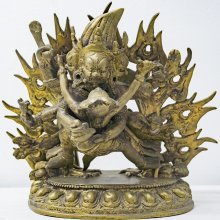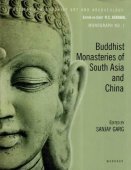Karuna, Karuṇā, Karuṇa: 46 definitions
Introduction:
Karuna means something in Buddhism, Pali, Hinduism, Sanskrit, Jainism, Prakrit, the history of ancient India, Marathi, Hindi, biology, Tamil. If you want to know the exact meaning, history, etymology or English translation of this term then check out the descriptions on this page. Add your comment or reference to a book if you want to contribute to this summary article.
Karuna has 45 English definitions available.
Alternative spellings of this word include Karun.
Images (photo gallery)
Languages of India and abroad
Sanskrit dictionary
[Deutsch Wörterbuch]
Source: Cologne Digital Sanskrit Dictionaries: Böhtlingk and Roth Grosses Petersburger WörterbuchKaruṇa (करुण):—am Anfange eines compos. vor einem partic. praet. pass. gaṇa sukhādi zu [Pāṇini’s acht Bücher 6, 2, 170. 171.]
1) adj. f. ā kläglich: niśamya damayantyāstatkaruṇaṃ paridevitam [Nalopākhyāna 5, 22.] uvāca damayantī taṃ naiṣadhaṃ karuṇaṃ vacaḥ [9, 25.] [Rāmāyaṇa 4, 8, 14.] tāṃ girāṃ karuṇāṃ śrutvā [Daśaratha’s Tod 1, 32.] karuṇadhvani [Vikramorvaśī 4, 1.] karuṇavilāpa [Vetālapañcaviṃśati 30, 3.] karuṇārambha der Beklagenswerthes unternimmt: hānārya karuṇārambha nṛśaṃsa kulapāṃsana [Rāmāyaṇa 3, 51, 25.] karuṇam adv. auf eine klägliche Weise: vilapya karuṇaṃ bahu [Nalopākhyāna 10, 28.] [Daśaratha’s Tod 2, 55.] karuṇaṃ bahu śocantīm [Nalopākhyāna 11, 19.] rurodārtā karuṇam [Rāmāyaṇa 1, 2, 14.] [Mahābhārata] in [Benfey’ Chrestomathie aus Sanskritwerken 8, 4.] [Pañcatantra 98, 1.] [Vetālapañcaviṃśati 30, 16.] [Śiśupālavadha 9, 67.] sakaruṇam dass. [Mṛcchakaṭikā 94, 16.] —
2) m. a) das Klägliche, Mitleid Erregende, einer der 9 Rasa oder Färbungen eines poetischen Werkes, [Amarakoṣa 1, 1, 2, 17.] [Hemacandra’s Abhidhānacintāmaṇi 294.] [Anekārthasaṃgraha 3, 194.] [Medinīkoṣa ṇ. 37.] [Rāmāyaṇa 1, 4, 7.] [Sāhityadarpana 209.] karuṇavipralambha [224.] Nach [GAUḌA] zu [Hemacandra’s Abhidhānacintāmaṇi 294] auch f. karuṇā . — b) karuṇa Name eines Baumes, Citrus decumana Lin., [Die Uṇādi-Affixe 3, 53.] [Hemacandra’s Abhidhānacintāmaṇi 1149.] [Hemacandra’s Anekārthasaṃgraha] [Medinīkoṣa] — c) ein Buddha (mitleidig) [Trikāṇḍaśeṣa 1, 1, 10.] — d) Nomen proprium eines Asura [Harivaṃśa] [LANGAL. II, 409.] [Die Calc. Ausg. 12943] : varuṇa . —
3) f. karuṇā Mitleid [Die Uṇādi-Affixe] [Amarakoṣa 1, 1, 7, 18. 3, 4, 13, 54.] [Hemacandra’s Abhidhānacintāmaṇi 369, 2.] [Hemacandra’s Anekārthasaṃgraha] [Medinīkoṣa] karuṇānvita [Rāmāyaṇa 4, 61, 2.] karuṇāpara mitleidig [Hemacandra’s Abhidhānacintāmaṇi 368.] karuṇāvimukhena mṛtyunā [Raghuvaṃśa 8, 66.] [Prabodhacandrodaja 43, 3.] saṃsāriṇāṃ (obj.) karuṇayā [Bhāgavatapurāṇa 1, 2, 3.] karuṇāṃ yathā ca kurute sa mayi [Sāhityadarpana 46, 22.] karuṇāvṛtti [Meghadūta 91.] akaruṇa grausam [Hārāvalī 262.] striyo hyakaruṇāḥ [Bhāgavatapurāṇa 9, 14, 37.] [Śiśupālavadha 9, 67.] niṣkaruṇa dass. [Pañcatantra IV, 16.] [Śākuntala 180.] sakaruṇa mitleidig: sakaruṇo duḥkhitāndraṣṭumakṣamaḥ [Bhāgavatapurāṇa 1, 13, 12.] sakaruṇena nirīkṣaṇena [8, 8, 25.] vacaḥ [1, 7, 49.] —
4) f. karuṇī Name einer Pflanze (grīṣmapuṣpī, cāriṇī, brahmacāriṇī, raktapuṣpī u. s. w.; in Kokaṇa: kakarakhiruṇi) [Rājanirghaṇṭa im Śabdakalpadruma] —
5) karuṇa (von 1. kar) n. Handlung; heiliges Werk [das 2, 1.] sa viśvasya ka.uṇasyeśe [Ṛgveda 1, 100, 7.] mamedu.karmanka.uṇe dhi jā.ā [Atharvavedasaṃhitā 12, 3, 47.] karmāsi ka.uṇamasi kri.āsam [Taittirīyasaṃhitā 1, 6, 4, 4.]
--- OR ---
Karuṇa (करुण):—
1) auch mitleidig [Bhāgavatapurāṇa 10, 22, 21. 32, 18. 33, 21.] —
2) a) [Oxforder Handschriften 130,a, No. 236.] —
3) [Oxforder Handschriften 230,b,24.] rasa [122,b,19.]
Source: Cologne Digital Sanskrit Dictionaries: Sanskrit-Wörterbuch in kürzerer FassungKaruṇa (करुण):——
1) Adj. (f. ā) — a) kläglich. m Adv. — b) mitleidig [Bhāgavatapurāṇa] —
2) m. — a) der klägliche — , Mitleid erregende Grundton eines poetischen Werkes. — b) *Citrus decumana. — c) *ein Buddha. — d) Nomen proprium eines Asura [Harivaṃśa 3,47,14.] —
3) f. karuṇā — a) Mitleid. — b) * = 2)a). — c) eine best. Tonfarbe [Saṃgitasārasaṃgraha 23.] —
4) *f. karuṇī eine best. Pflanze [Rājan 10,108.] —
5) n. Handlung , heiliges Werk.
Sanskrit, also spelled संस्कृतम् (saṃskṛtam), is an ancient language of India commonly seen as the grandmother of the Indo-European language family (even English!). Closely allied with Prakrit and Pali, Sanskrit is more exhaustive in both grammar and terms and has the most extensive collection of literature in the world, greatly surpassing its sister-languages Greek and Latin.
See also (Relevant definitions)
Starts with (+122): Karu-nakapatalam, Karu-narpetti, Karuna kalang, Karuna Sutta, Karunaabhi, Karunabala, Karunabhavana, Karunabhidhana, Karunabhyudaya, Karunabrahmavihara, Karunacam, Karunacculi, Karunacitta, Karunadhimutta, Karunadhvani, Karunadoru, Karunadu, Karunagunaja, Karunai, Karunai kizhangu.
Ends with (+13): Adikaruna, Akaruna, Apakaruna, Astakaruna, Atikaruna, Atinishkaruna, Ekantakaruna, Enenkaruna, Girishakaruna, Kalekaruna, Kalenkaruna, Karakaruna, Kattu-k-karuna, Lagetagenkaruna, Maha-jambirakaruna, Mahakaruna, Maitrikaruna, Nikaruna, Nikkaruna, Nishkaruna.
Full-text (+434): Karunamaya, Karunam, Karunavedita, Akaruna, Karunika, Karunamalli, Karunavipralambha, Karunapara, Akarunatva, Mahakaruna, Karunatman, Sakaruna, Nishkaruna, Brahmavihara, Apakaruna, Karunavati, Sakarunam, Karunavritti, Karunakalpalata, Karunya.
Relevant text
Search found 131 books and stories containing Karuna, Karuṇā, Karuṇa, Karūṇa, Karūna, Kāruṇa, Kāṟuṇa, Karunaa; (plurals include: Karunas, Karuṇās, Karuṇas, Karūṇas, Karūnas, Kāruṇas, Kāṟuṇas, Karunaas). You can also click to the full overview containing English textual excerpts. Below are direct links for the most relevant articles:
Brihad Bhagavatamrita (commentary) (by Śrī Śrīmad Bhaktivedānta Nārāyana Gosvāmī Mahārāja)
Verse 2.4.128 < [Chapter 4 - Vaikuṇṭha (the spiritual world)]
Verse 1.5.82 < [Chapter 5 - Priya (the beloved devotees)]
Verse 1.4.37 < [Chapter 4 - Bhakta (the devotee)]
Bhakti-rasamrta-sindhu (by Śrīla Rūpa Gosvāmī)
Verse 4.8.8 < [Part 8 - Compatible & Incompatible Mellows (maitrī-vaira-sthiti)]
Verse 4.8.12 < [Part 8 - Compatible & Incompatible Mellows (maitrī-vaira-sthiti)]
Verse 2.1.132 < [Part 1 - Ecstatic Excitants (vibhāva)]
Garga Samhita (English) (by Danavir Goswami)
Verse 6.7.27 < [Chapter 7 - The Marriage of Śrī Rukmiṇī]
Verse 1.14.30 < [Chapter 14 - The Liberation of Śakaṭāsura and Tṛṇāvarta]
Verse 5.10.8 < [Chapter 10 - The Stories of the Washerman, Weaver, and Florist]
Sahitya-kaumudi by Baladeva Vidyabhushana (by Gaurapada Dāsa)
Text 4.27 < [Chapter 4 - First-rate Poetry]
Text 4.31 < [Chapter 4 - First-rate Poetry]
Text 4.11 < [Chapter 4 - First-rate Poetry]
Vishnudharmottara Purana (Art and Architecture) (by Bhagyashree Sarma)
1.3. Elements of Drama (h): Sentiment (Rasa) < [Chapter 3 - Drama and Dance]
2.6. Dṛṣṭi (sight or glance) < [Chapter 3 - Drama and Dance]
2. The Viṣṇudharmottara-purāṇa and the Indian Classical Dances < [Chapter 6 - Modern Relevance of Different Art Forms and Architecture]
Shrimad Bhagavad-gita (by Narayana Gosvami)
Verses 12.13-14 < [Chapter 12 - Bhakti-yoga (Yoga through Pure Devotional Service)]
Related products




